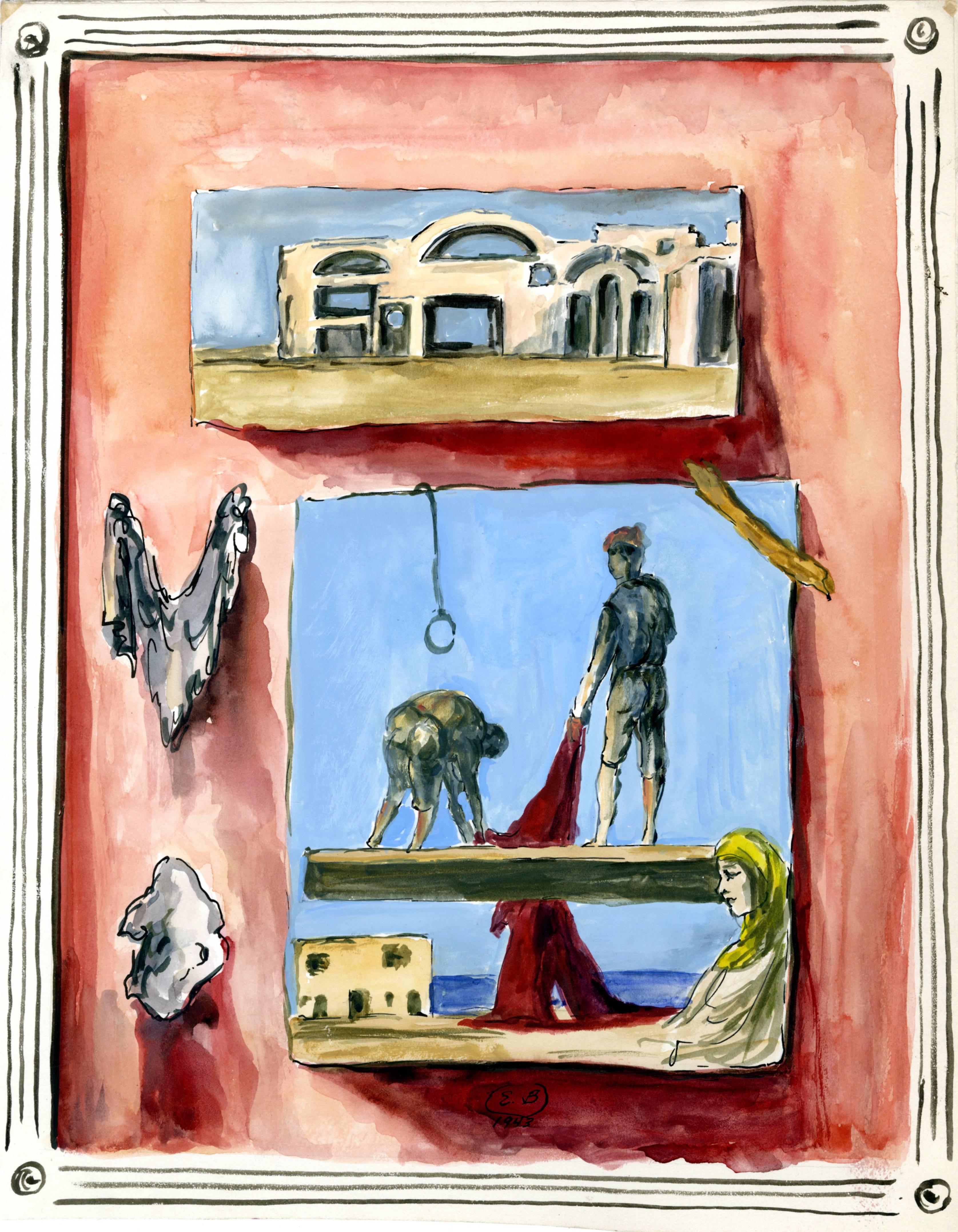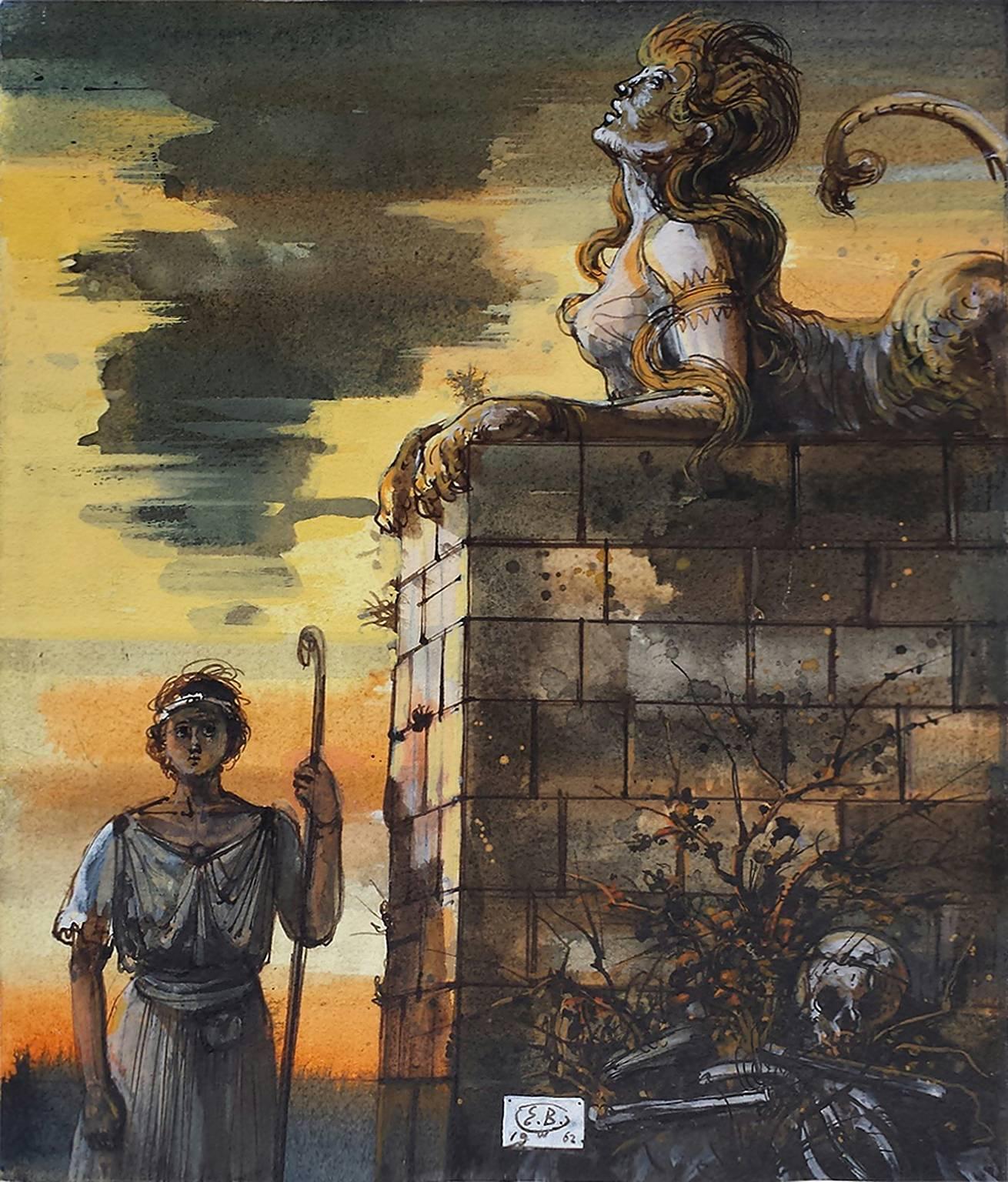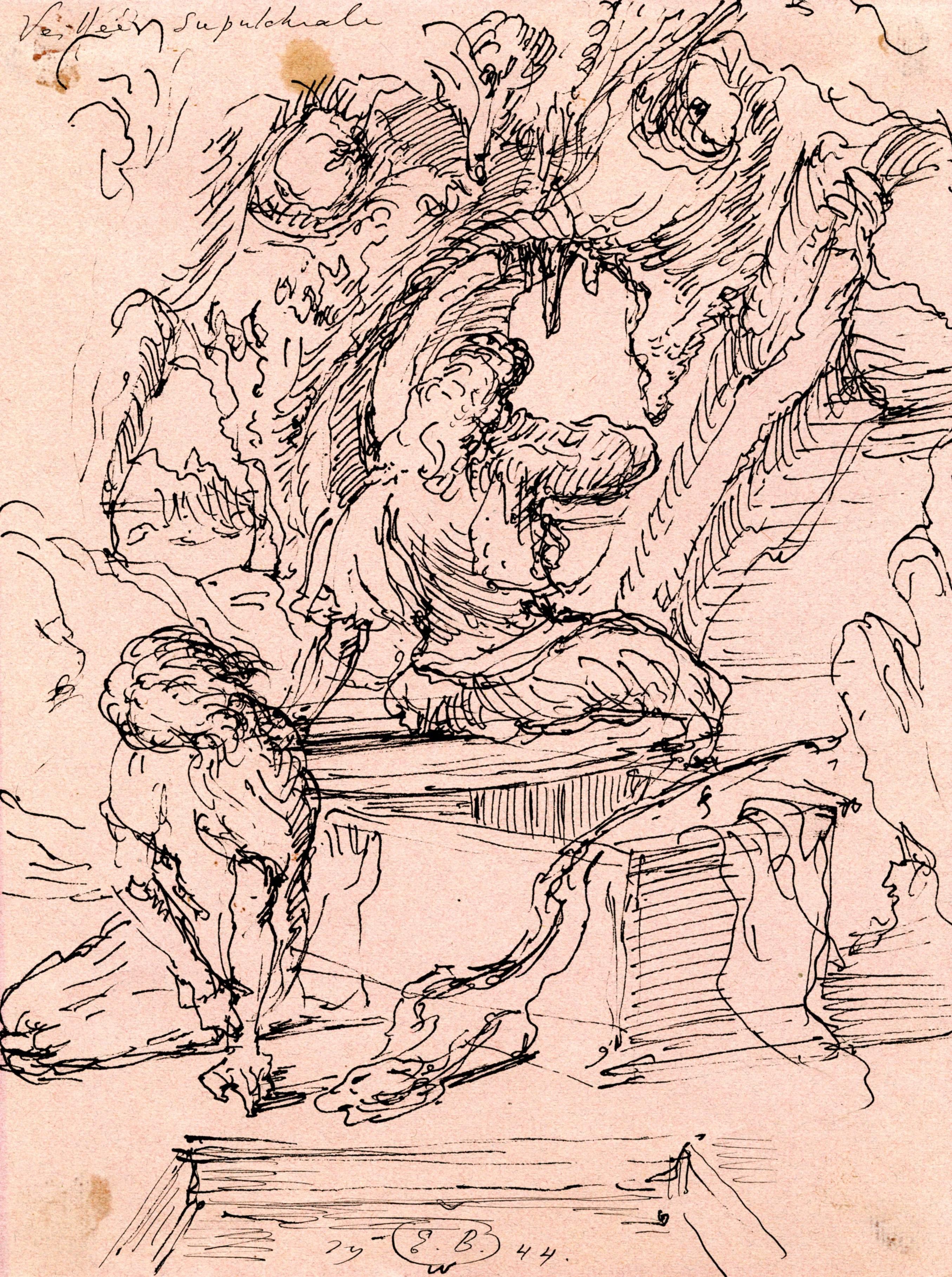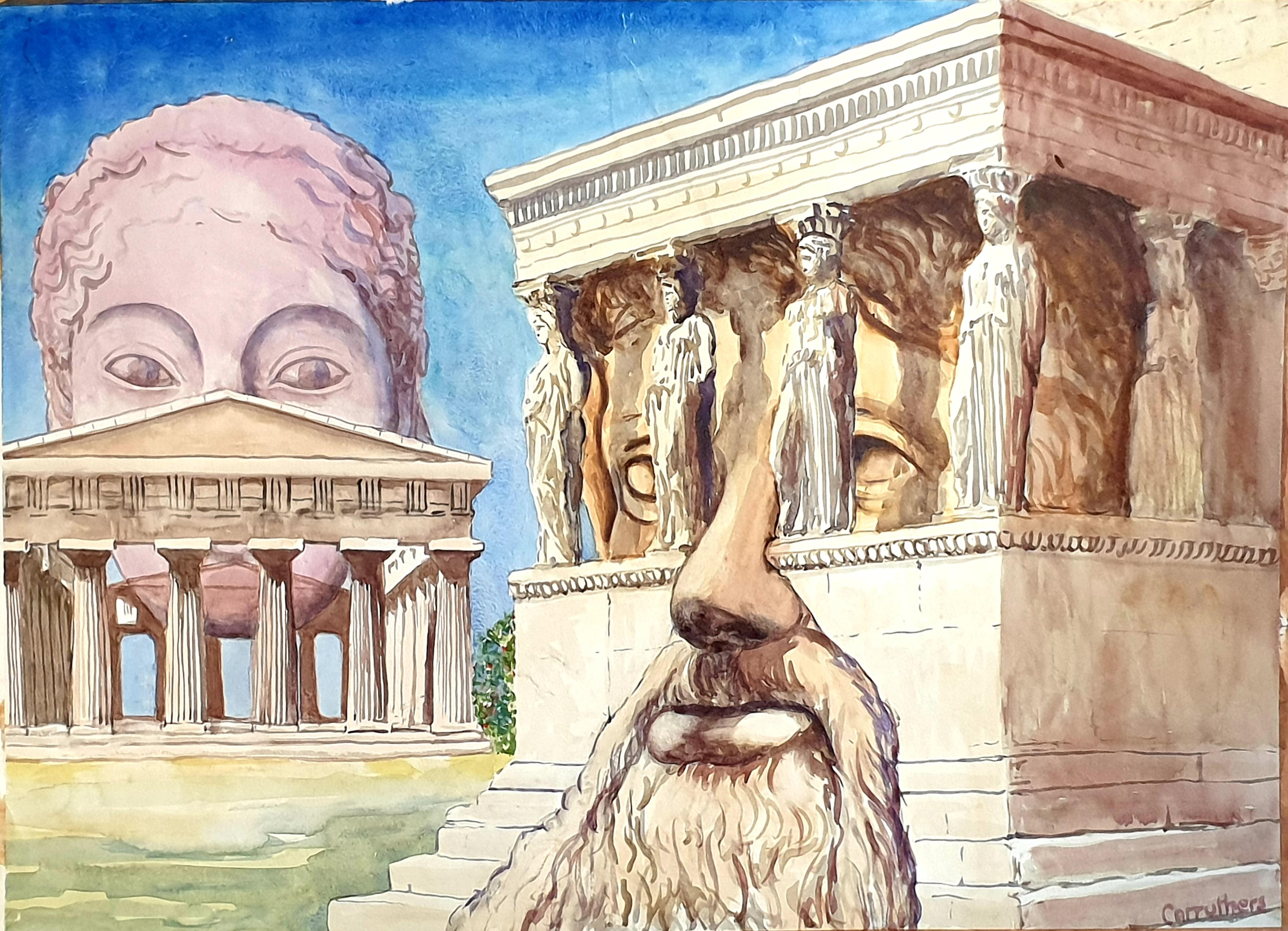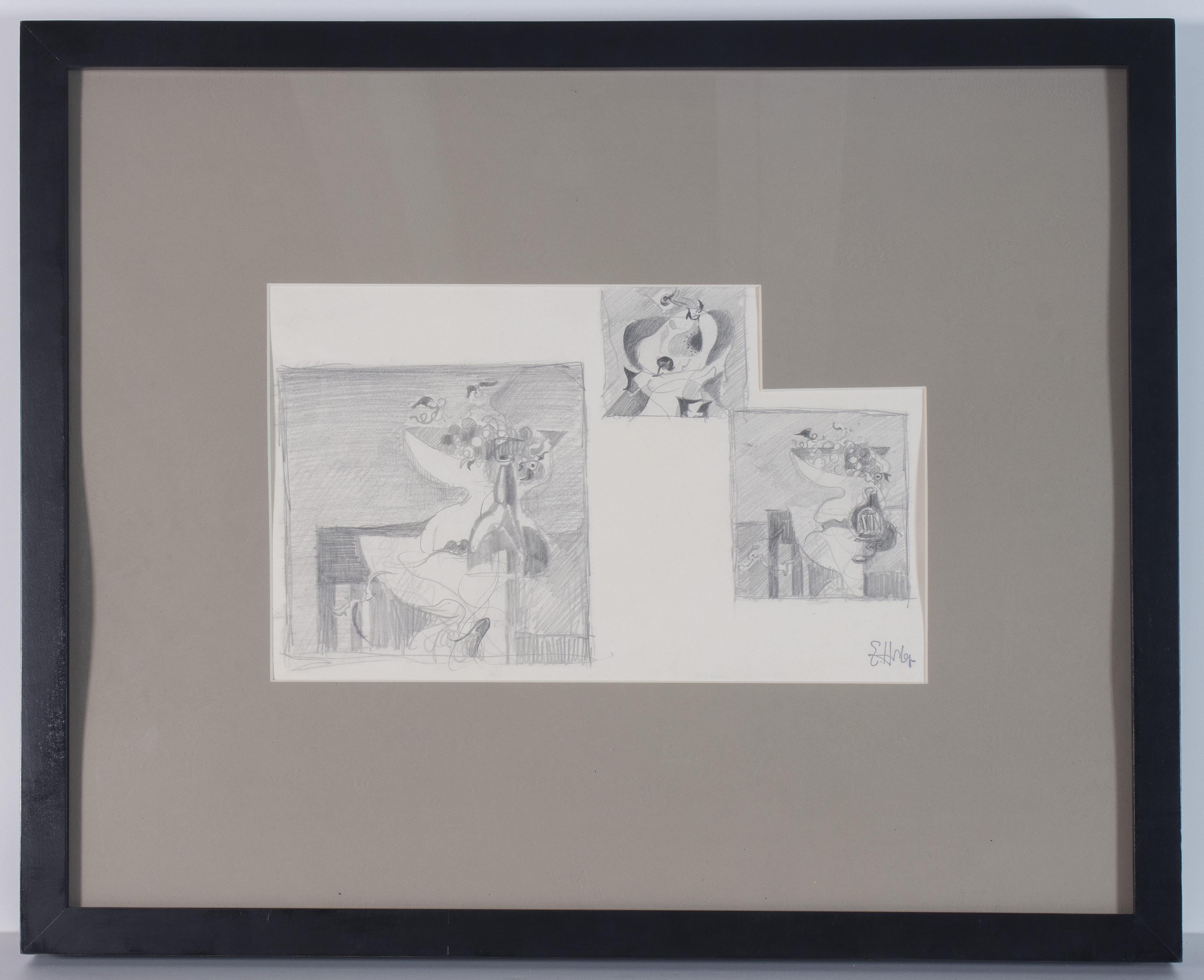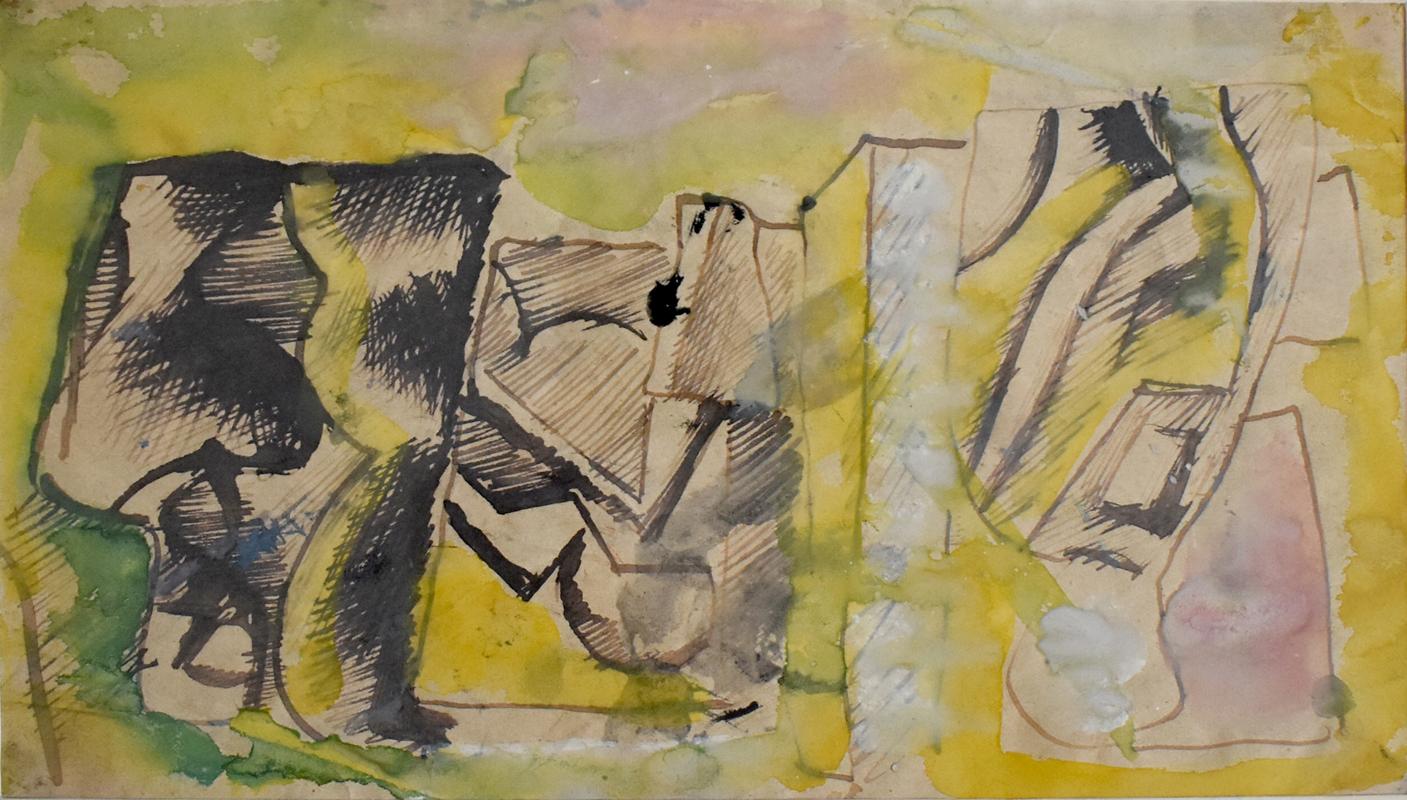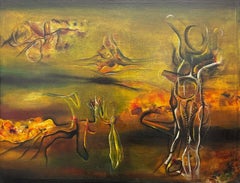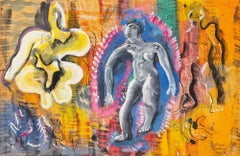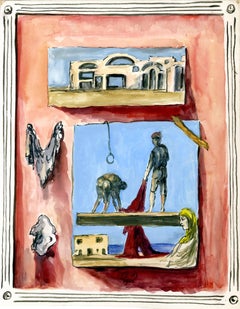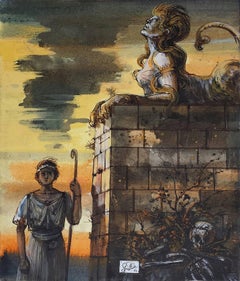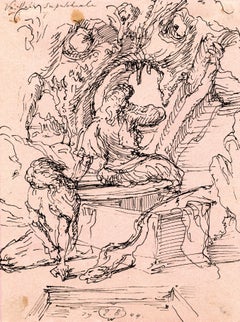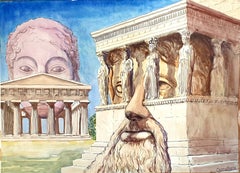Items Similar to "Three Medusas, " Eugene Berman, Surrealism, Greek Still Life
Want more images or videos?
Request additional images or videos from the seller
1 of 10
Eugene Berman"Three Medusas, " Eugene Berman, Surrealism, Greek Still Life1968
1968
$4,400
$5,50020% Off
£3,324.93
£4,156.1720% Off
€3,839.48
€4,799.3620% Off
CA$6,148.34
CA$7,685.4220% Off
A$6,822.10
A$8,527.6220% Off
CHF 3,573.56
CHF 4,466.9520% Off
MX$83,657.22
MX$104,571.5220% Off
NOK 45,454.46
NOK 56,818.0820% Off
SEK 42,907.08
SEK 53,633.8420% Off
DKK 28,633.44
DKK 35,791.8020% Off
Shipping
Retrieving quote...The 1stDibs Promise:
Authenticity Guarantee,
Money-Back Guarantee,
24-Hour Cancellation
About the Item
Eugene Gustavovitch Berman (1899 - 1972)
Three Medusas, 1968
Watercolor on paper
12 x 9 1/2 inches
Initialed and dated lower right
Provenance:
Larcada Gallery, New York
Frank Oehlschlager Gallery, Sarasota, Florida
Private Collection
Caldwell Gallery, Hudson, New York
Exhibited:
Hudson, New York, Caldwell Gallery, Living with Art, November 21 - December 31, 2020.
From Russia, Eugene Berman became a painter known for his imaginary landscapes and for his Baroque stage set designs including for ballets and the Metropolitan Opera in New York. In France, he became a leader among the Neo-Romantic artists, who defied the prevalent abstract movements including Cubism and Futurism and focused on expression of human emotion. He and his peers, including Georgio De Chirico, depicted a fantasy world of loneliness and isolation that existed only in their minds.
He was fascinated by solitary figures amidst ruins, and much of his work explored space and the passing of time. He painted with oil on canvas and achieved the smooth effect of the Old Masters. In his landscapes, he placed his figures and architectural structures very precisely with an order that encouraged viewer contemplation and did not offer distractions.
Berman was born into a wealthy family of professionals in St. Petersburg in 1899. His father died when he was seven, but his stepfather willingly paid for his art education in Germany, Switzerland, and France. In 1918, during the Bolshevik Revolution, he fled with his family to Paris where he studied art at the Academie Ranson from 1920 to 1922. Pierre Bonnard, a Neo-Romanticist, was a major influence on his canvases because of Bonnard's focus on color, pattern, and design.
By the late 1920s, Berman finally was having success selling his paintings, which was a contrast to his struggles in the past when he had little money and could not afford canvases nor the quality pigment he needed. To overcome these hurdles, he had bought old paintings at flea markets, repaired the canvas, and painted over them.
In 1929, Berman had his first exhibition in America, and it was held at the Julian Levy Gallery in New York. Berman and Levy had met in Paris, where Levy had shown much interest in Surrealism and Neo Romanticism. From 1929 to 1947, Berman continued to exhibit at the Levy Gallery.
In Berman's paintings, he showed his fascination with architecture, a subject that he often explored in eerie landscapes. He toured Europe extensively, especially Italy, to learn more about architecture and developed a special interest in the Baroque architectural drawings of Giovanni Guercino (1591-1666).
In 1935, Berman became a war refugee as did his brother, Leonid, and the two men moved to the United States, joining many of their refugee friends in New York. He became a U.S. citizen, and stayed first in New York and then moved to Los Angeles, where he married Ona Muson. They traveled widely and did well because his paintings gained increasing acceptance in America.
In 1937, Town and Country magazine had his work on the cover, and that same year, he began designing sets for ballet performances. He also designed sets for hundreds of Metropolitan Opera performances as well as European opera companies, something from which he retired in 1955. His stage sets included productions of Rigoletto, Don Giovanni, and Othello, dramatic performances that fit his inclinations for intensification and heightened emotions. In this artist's view, "human experience is only a part of a theatrical and surreal dream infused with a sense of tragedy."
In 1947 and 1949, Berman had Guggenheim Fellowships with which he toured the Southwest and Mexico, and in these landscapes, he found the desolate images that accorded with his earlier Neo-Romantic and Surrealist paintings that were derived only from his imagination. On his return, he did a series of Pre-Columbian and Baroque monuments that he had seen in Mexico.
In the 1950s and 60s, many international shows of his work were held, including exhibitions of his theater designs. In 1957, he retired to Rome, where he pursued his interest in people in relation to ancient buildings and landscapes, and he died there in 1972.
- Creator:Eugene Berman (1899 - 1972, Russian)
- Creation Year:1968
- Dimensions:Height: 19 in (48.26 cm)Width: 15.5 in (39.37 cm)
- Medium:
- Movement & Style:
- Period:
- Condition:Excellent.
- Gallery Location:New York, NY
- Reference Number:1stDibs: LU184129905042
About the Seller
5.0
Platinum Seller
Premium sellers with a 4.7+ rating and 24-hour response times
Established in 2022
1stDibs seller since 2022
108 sales on 1stDibs
Typical response time: <1 hour
- ShippingRetrieving quote...Shipping from: New York, NY
- Return Policy
Authenticity Guarantee
In the unlikely event there’s an issue with an item’s authenticity, contact us within 1 year for a full refund. DetailsMoney-Back Guarantee
If your item is not as described, is damaged in transit, or does not arrive, contact us within 7 days for a full refund. Details24-Hour Cancellation
You have a 24-hour grace period in which to reconsider your purchase, with no questions asked.Vetted Professional Sellers
Our world-class sellers must adhere to strict standards for service and quality, maintaining the integrity of our listings.Price-Match Guarantee
If you find that a seller listed the same item for a lower price elsewhere, we’ll match it.Trusted Global Delivery
Our best-in-class carrier network provides specialized shipping options worldwide, including custom delivery.More From This Seller
View All"Complementary Angels" Aaron Bohrod, Pun Humor, Magic Realism, Putti
By Aaron Bohrod
Located in New York, NY
Aaron Bohrod
Complementary Angels, 1977
Signed lower center
Oil on gesso panel
16 x 12 inches
Aaron Bohrod's work has not been limited to one style or medium. Initially recognized as a regionalist painter of American scenes, particularly of his native Chicago, Bohrod later devoted himself to detailed still-life paintings rendered in the trompe l'oeil style. He also worked for several years in ceramics and wrote a book on pottery.
Born in 1907, Bohrod began his studies at Chicago's Crane Junior College in 1925, and two years later enrolled in the Art Institute of Chicago. But it was at the Art Students League in New York City, from 1930 to 1932, that he studied under the man believed to be his most significant early influence, John Sloan. Sloan's romantic realism is reflected in the many depictions of Chicago life...
Category
1970s Realist Animal Paintings
Materials
Oil, Board
"Untitled" Gerome Kamrowski, circa 1944 American Surrealist Composition
By Gerome Kamrowski
Located in New York, NY
Gerome Kamrowski
Untitled, circa 1944
Signed lower right
Oil on canvas
35 3/4 inches x 47 3/4 inches
Gerome Kamrowski was born in Warren, Minnesota, on January 19, 1914. In 1932 he...
Category
1940s Surrealist Abstract Paintings
Materials
Canvas, Oil
"Composition with Figure, " Irene Rice Pereira
By Irene Rice Pereira
Located in New York, NY
Irene Rice Pereira
Composition with Figure, 1951
Inscribed, signed and dated Salford/Pereira 2/51 (lr); inscribed I Rice Pereira/2669 Great Clowes St/Sa...
Category
1950s Abstract Abstract Paintings
Materials
Paper, India Ink, Casein
"Gallimaufry" Aaron Bohrod, Realism, Surrealism, Charlie Brown, Buddha, Gnome
By Aaron Bohrod
Located in New York, NY
Aaron Bohrod
Gallimaufry, 1989
Signed on the right
Oil on gesso panel
14 x 11 inches
Aaron Bohrod's work has not been limited to one style or medium. Initially recognized as a regionalist painter of American scenes, particularly of his native Chicago, Bohrod later devoted himself to detailed still-life paintings rendered in the trompe l'oeil style. He also worked for several years in ceramics and wrote a book on pottery.
Born in 1907, Bohrod began his studies at Chicago's Crane Junior College in 1925, and two years later enrolled in the Art Institute of Chicago. But it was at the Art Students League in New York City, from 1930 to 1932, that he studied under the man believed to be his most significant early influence, John Sloan. Sloan's romantic realism...
Category
1980s Realist Animal Paintings
Materials
Oil, Board
"Figures, " Melecio Galvan, Modern Mexican Anti-War Artist, Social Justice
Located in New York, NY
Melecio Galvan (1945 - 1982)
Figures, 1968
Sepia on paper
18 x 22 inches
Signed and dated lower right
Provenance:
Estate of the artist
Melecio Galván (San Rafael, Mexico, 1945 - 1982) was a Mexican draughtsman who was little-known during his lifetime. This is principally because he was a socio-politically committed artist wary of the commercial gallery circuit as well as art institutions controlled by the state. He arose from a working-class family in San Rafael, on the outskirts of Mexico City, and died under mysterious circumstances in that town at the age of 37, just when he was reaching the apogee of his mature style. Galván studied at the Academia San Carlos in Mexico City between 1965 and 1968. His preferred medium was ink on paper, and he created page upon page of sketchbooks filled with drawings. The major themes he developed in his work were reinterpretations of classical drawings of the human figure and anatomy studies, explorations of the grotesque, and themes related to the socio-political situation in Mexico, especially following the 1968 Tlateloco Massacre. In 1971-72, he traveled to Northern California where he collaborated on a mural in Fresno and created illustrations for the Latino journal Basta Ya (Enough Already) in San Francisco. Back in Mexico City, from 1977 to 1981 he was a member of the Grupo MIRA, primarily comprised of printmakers who favored themes of politics and social justice...
Category
1960s Figurative Drawings and Watercolors
Materials
Paper, Pigment
"Faun and Fawn" Aaron Bohrod, Realist Still Life, Deer and Putti
By Aaron Bohrod
Located in New York, NY
Aaron Bohrod
Faun and Fawn, 1984
Signed lower right
Oil on gesso board
16 x 12 inches
Aaron Bohrod's work has not been limited to one style or medium. Initially recognized as a regionalist painter of American scenes, particularly of his native Chicago, Bohrod later devoted himself to detailed still-life paintings rendered in the trompe l'oeil style. He also worked for several years in ceramics and wrote a book on pottery.
Born in 1907, Bohrod began his studies at Chicago's Crane Junior College in 1925, and two years later enrolled in the Art Institute of Chicago. But it was at the Art Students League in New York City, from 1930 to 1932, that he studied under the man believed to be his most significant early influence, John Sloan. Sloan's romantic realism is reflected in the many depictions of Chicago life, which comprised most of Bohrod's early work.
Under Sloan's tutelage, Bohrod came to subscribe to the belief that painters should find the subjects of their art in the immediate world around them. These paintings emphasized architecture unique to north Chicago and featured Chicagoans engaged in such everyday activities as working, playing or going to the theatre. The romantic aspect was conveyed by the use of misty colors, and the realism by attention to detail.
In 1936, Bohrod won the Guggenheim Fellowship award in creative painting...
Category
1980s Realist Animal Paintings
Materials
Oil, Board
You May Also Like
Trompe-l'Oeil Study
By Eugene Berman
Located in Fairlawn, OH
Trompe-l'Oeil Study
Watercolor on heavy wove paper, 1943
Signed with the artists initials, lower center of image; Dated 1943, lower center of image
Provenance:
Swann Galleries, 2007, realized $2,640
Condition: Excellent. Fresh colors. Framed with conservation glass.
Sheet: 14 3/4 x 11 1/4"
Frame size: 20 3/4 x 17
Berman brothers (painters)
From Wikipedia, the free encyclopedia
Eugene Berman in Italy in the 1960s
Eugène Berman (Russian: Евгений Густавович Берман; 4 November 1899, Saint Petersburg, Russia – 14 December 1972, Rome) and his brother Leonid Berman...
Category
1930s Surrealist Still-life Drawings and Watercolors
Materials
Watercolor
Oedipus And The Sphinx
By Eugene Berman
Located in Miami, FL
Initialed in cartouche bottom center
Provenance: Robert L. B. Tobin Foundation
Matted but Unframed
Category
1960s Surrealist Figurative Drawings and Watercolors
Materials
Gouache, India Ink
Veillee Sepulchrale; Verso: Study of two figures in a landscape
By Eugene Berman
Located in Fairlawn, OH
Veillee Sepulchrale
Verso: Study of two figures in a landscape
Pen and ink on rose colored Canson watermark paper, 1944
Signed in ink with the artist's initials lower center (see photo)
Dated 1944 lower center;
Titled in ink upper left corner (see photo)
Provenance:
Swann Galleries, 2010, realized $900.
John Popplestone (1928-2013), Akron, OH collector, noted psychologist and author
Berman brothers (painters)
From Wikipedia, the free encyclopedia
Jump to navigationJump to search
This article is about the painters. For the American songwriters/producers, see Berman Brothers (producers).
Eugene Berman in Italy in the 1960s
Eugène Berman (Russian: Евгений Густавович Берман; 4 November 1899, Saint Petersburg, Russia – 14 December 1972, Rome) and his brother Leonid Berman...
Category
1940s Surrealist Landscape Drawings and Watercolors
Materials
Ink, Pen
Surrealist Watercolour/Gouache on Paper. 'The Birth of Sculpture''
Located in Cotignac, FR
Late 20th century surrealist gouache and watercolour on paper by British artist Derek Carruthers. The painting is signed to the bottom right and title...
Category
Late 20th Century Surrealist Landscape Paintings
Materials
Paper, Watercolor, Gouache
Three Cubist Still Life Studies by Philadelphia Artist and Collector Earl Horter
By Earl Horter
Located in Philadelphia, PA
Earl Horter (American, 1883-1940)
Three Still Life Studies
Pencil on paper, 7 1/4 x 13 1/2 inches; Framed: 17 x 21 inches
NOTE: while originally mounted with archival materials, the...
Category
Early 20th Century Cubist Abstract Drawings and Watercolors
Materials
Paper, Pencil
Studies for Three Figures - Italian art, Composition, Futurism, Watercolour
By Mario Sironi
Located in London, GB
MARIO SIRONI 1885-1961
Sassari 1885-1961 Milan (Italian)
Title: Studies for Three Figures Studio per le Tre Figure, 1948
Technique: Hand Signed Pen and Watercolour Drawing on Pape...
Category
1940s Interior Prints
Materials
Watercolor, Pen
